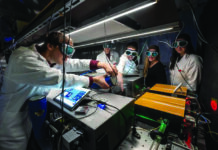
A project led by the University of Surrey will manufacture a miniature building model, with state-of-the-art pressure, airspeed and temperature sensors, with the aim being to help develop a better understanding of how to tackle air pollution in cities across the world.
Urban air pollution is very difficult to measure, as flow of air between buildings can affect how vehicles’ exhaust and other pollutants are carried away from street level. It is also a challenge to understand how hot, stagnant air within buildings can be replaced with cool, fresh air from the outside with minimal energy input, and how cities themselves impact temperatures and local weather patterns. The best and most practical way to study the air between buildings is by using a wind tunnel – but each wind tunnel is different and the effects on scientific measurements can be significant. Accuracy is another major problem with studying the pollution around buildings as scientists need to be able to track pockets of air the size of melons – however, there are too many melon-sized air pockets in a city neighbourhood for a computer simulation: even the fastest, most powerful computers are not able to track them all.
The University of Surrey, alongside Surrey Sensors, has been awarded £140,000 from the Natural Environment Research Council to build a “smart” generic model building that can be used in any wind tunnel with some of the world’s most advanced built-in sensors for measuring pressure, airspeed and temperature. The model will also have the ability to heat its own walls, to simulate the effect of the sun.
The team behind the project will allow other wind tunnels to use the model to verify their accuracy and it is hoped that in time the model could return valuable information for scientists – such as how pollution spreads in a city, how building ventilation can be made more efficient, and how indoor air quality can be improved- all without the need to insert any other measurement tools which may interfere with air flow.
Dr David Birch, project lead from the University of Surrey, said: “People are finally acknowledging the fact that we are living through a climate change crisis and we all have a duty to do everything we can to nurse our planet back to health. We believe our “Smart Cube” has the potential to deliver the accuracy and resolution needed for scientists’ crucial efforts to understand and tackle air pollution in cities across the world.”







